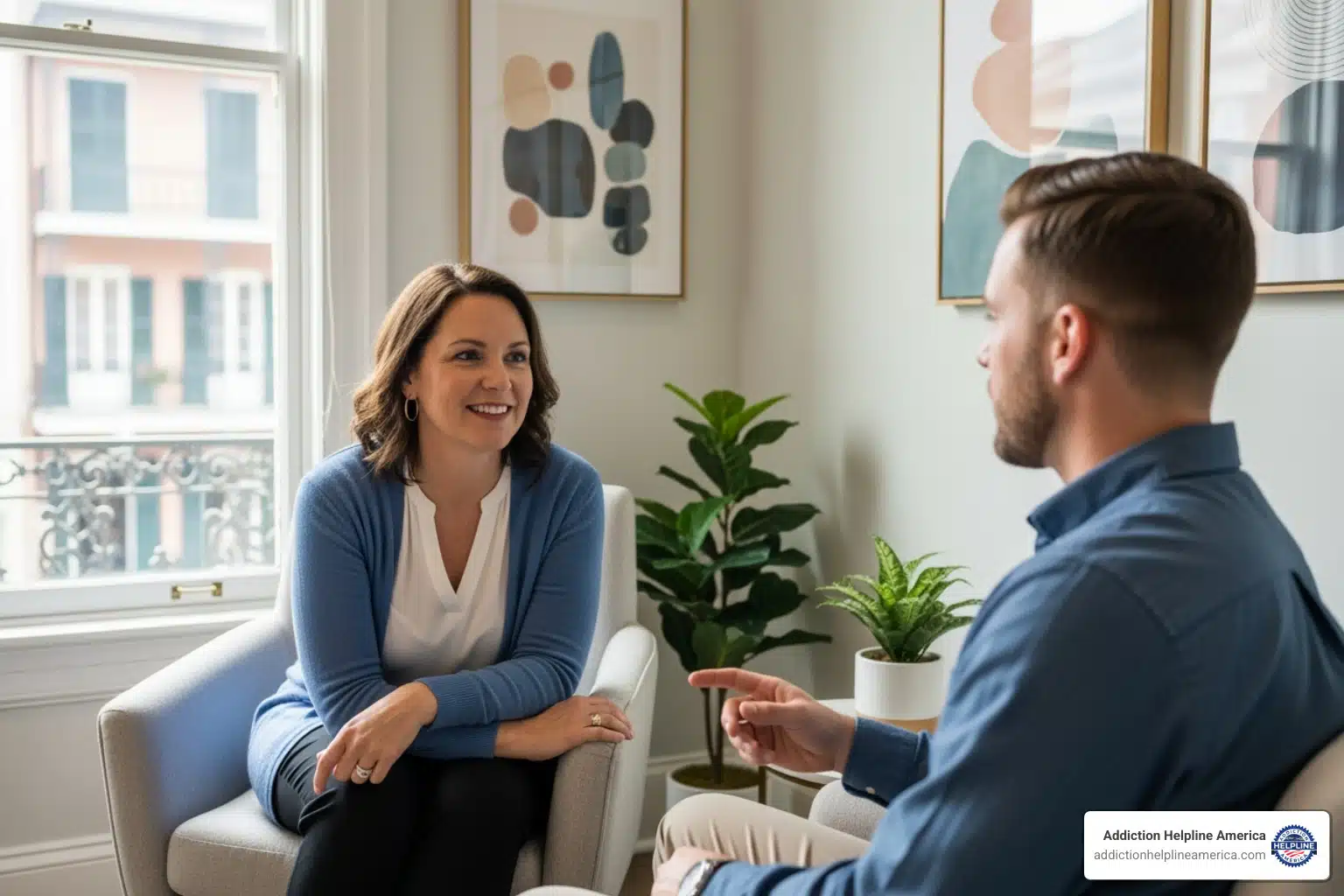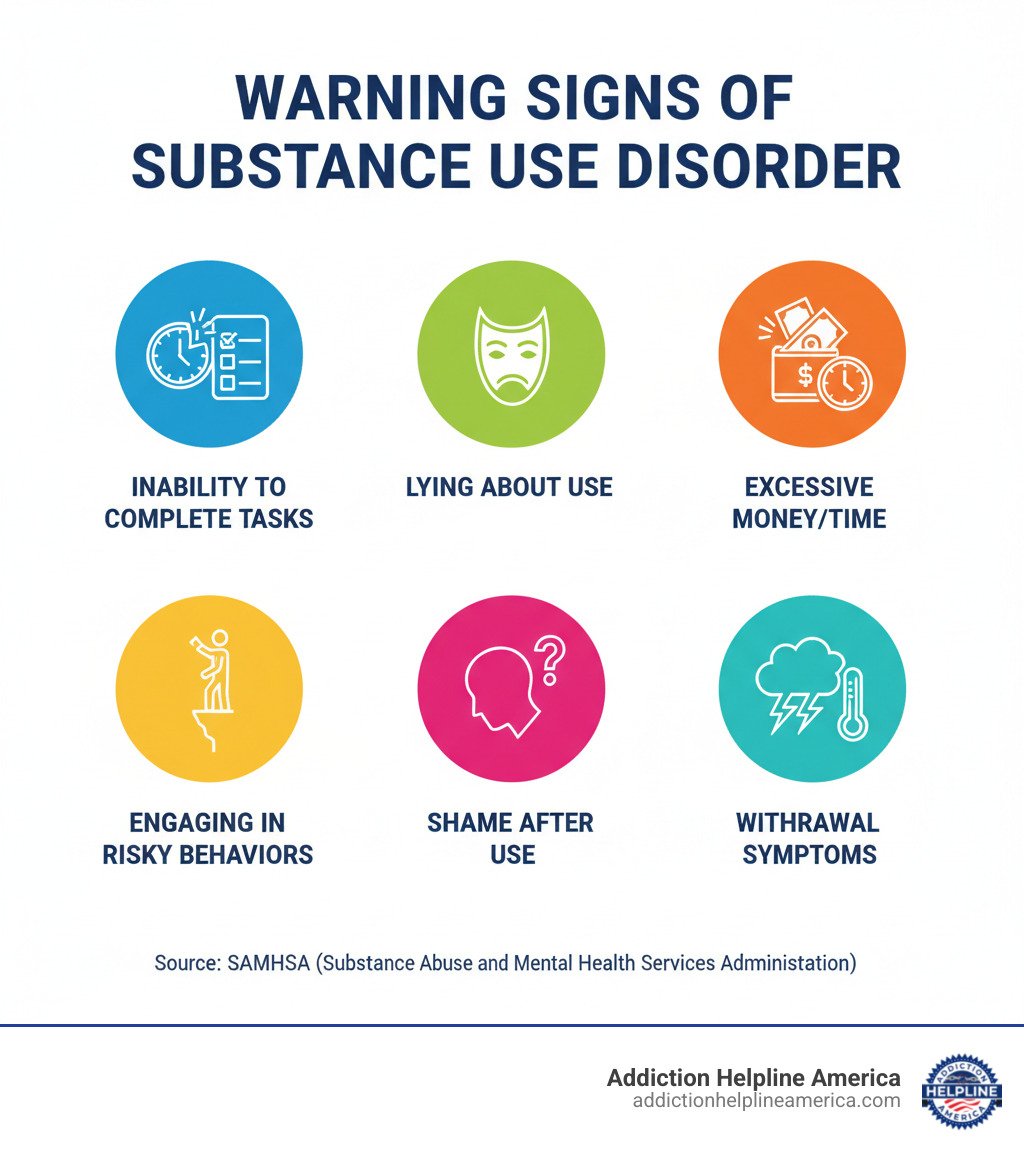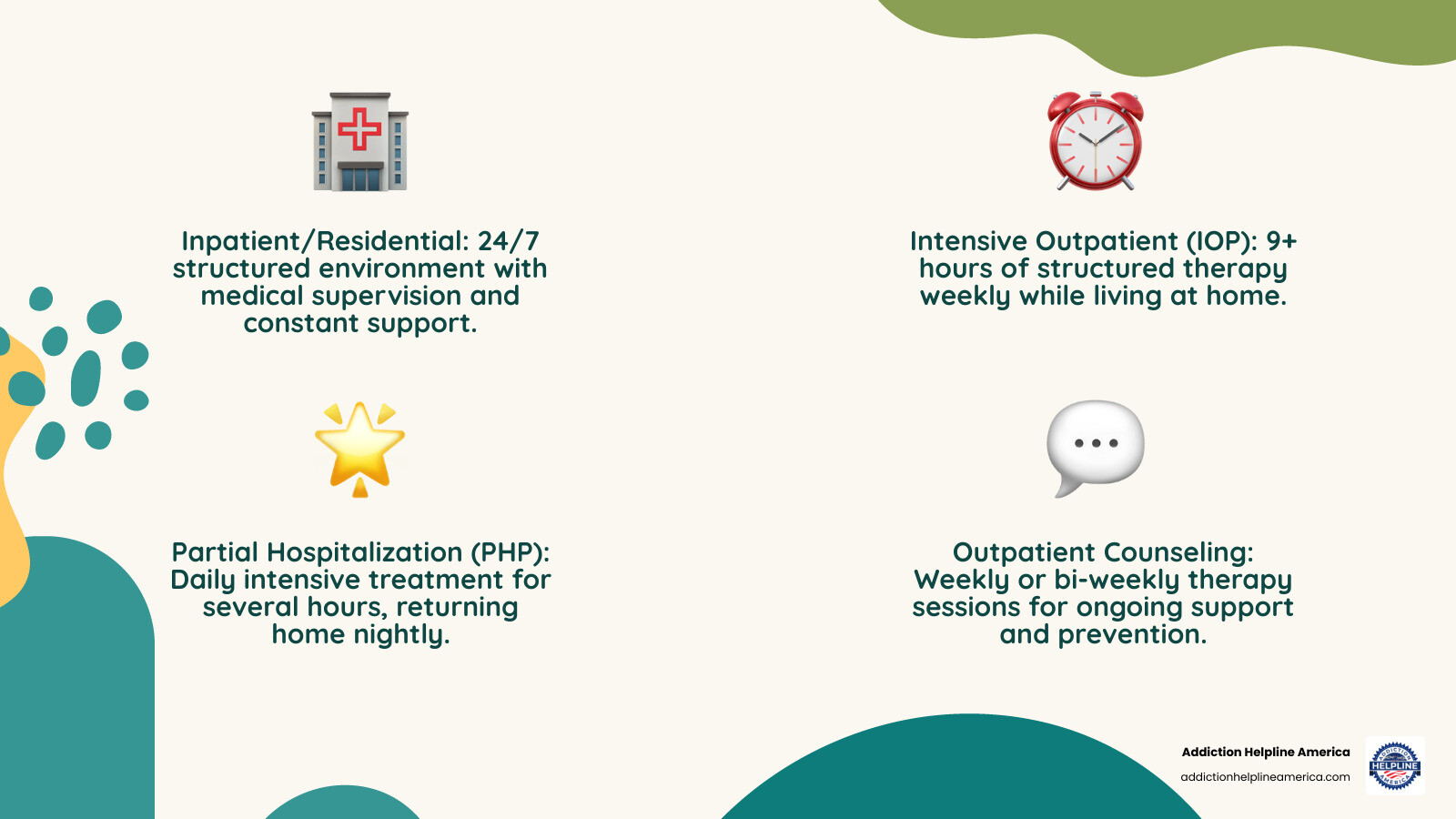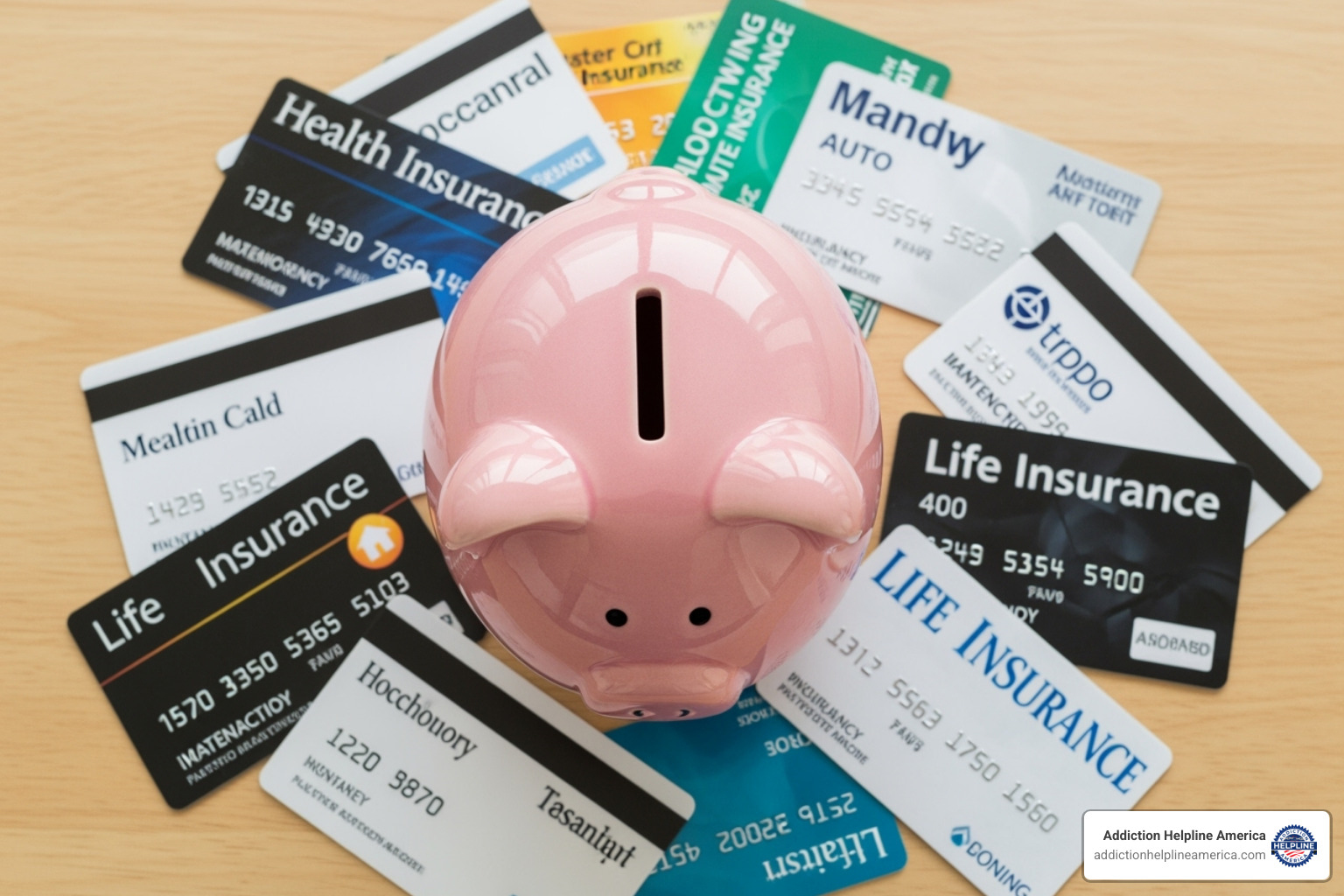
The Reality of Addiction in the Big Easy
Addiction counseling New Orleans offers a pathway to hope for those struggling with substance use disorders. If you need help, your primary options include:
- Individual Therapy: One-on-one sessions with a licensed counselor.
- Group Therapy: Peer support sessions focused on shared experiences.
- Intensive Outpatient Programs (IOP): Structured treatment for 9+ hours per week.
- Family Counseling: Support for loved ones affected by addiction.
- Specialized Programs: Trauma-informed care, LGBTQ+ support, and dual diagnosis treatment.
The numbers paint a stark picture. In 2022, 11.5% of Louisiana residents aged 12 or older had a substance use disorder. A year earlier, New Orleans’ opioid overdose death rate was 28.5 per 100,000 people, far exceeding the national average.
Yet behind these statistics lies hope. As one local counselor with 18+ years of recovery experience says: “If you feel your behaviors, substance, or alcohol use has either taken over your life or simply began to slip beyond your control, there is a way out.”
Professional counseling provides evidence-based methods, licensed expertise, and structured accountability that self-help cannot. New Orleans has a network of qualified counselors trained to treat alcohol dependency, opioid addiction, and behavioral addictions using proven approaches like Cognitive Behavioral Therapy (CBT).
At Addiction Helpline America, we connect people with effective addiction counseling New Orleans resources. We know that the right therapeutic relationship can be the key to lasting sobriety.
Understanding the Need for Professional Counseling
Recognizing when substance use becomes an addiction can be difficult. Key warning signs include:
- Being unable to complete daily tasks due to preoccupation with use.
- Lying about or hiding substance use.
- Spending excessive time or money on substances.
- Engaging in risky behaviors while under the influence.
- Feeling shame or guilt after using.
- Experiencing withdrawal symptoms when trying to stop.
- Developing a tolerance, needing more to get the same effect.
- Neglecting responsibilities at work, school, or home.
- Continuing to use despite negative consequences.
In New Orleans, where the opioid overdose death rate was 28.5 per 100,000 in 2021, these signs carry an urgent weight. The latest research on overdose trends confirms that professional intervention is life-saving.
Why Professional Counseling Outweighs Self-Help
While personal determination is important, willpower alone is rarely enough for long-term sobriety. Addiction counseling New Orleans professionals provide critical elements that self-help lacks:
- Structure and Accountability: A personalized recovery plan with clear milestones.
- Evidence-Based Methods: Proven techniques like CBT and Motivational Interviewing.
- Licensed Expertise: Trained professionals (LACs, LPCs) who understand the complexities of addiction.
- Confidentiality: A safe, non-judgmental space for honest self-examination.
- Dual Diagnosis Treatment: The ability to treat co-occurring mental health issues.
Recognizing Co-Occurring Mental Health Issues
Addiction often co-exists with conditions like anxiety, depression, trauma, PTSD, or bipolar disorder. Many people self-medicate to cope with the symptoms of these underlying issues. Trying to treat addiction without addressing them is like fixing a leak while ignoring a broken pipe.
Integrated treatment addresses both the substance use and mental health condition simultaneously. Many addiction counseling New Orleans professionals specialize in trauma-informed care or use therapies like Dialectical Behavior Therapy (DBT) to teach healthy coping skills. Professional counseling helps you build a new life by addressing all the factors that contributed to addiction.
Types of Addiction Counseling Services Available in New Orleans
New Orleans provides a rich mix of addiction counseling New Orleans services, recognizing that every recovery journey is unique. Common options include:
- Individual Therapy: Provides a private space to explore personal triggers and underlying issues with a dedicated counselor.
- Group Therapy: Offers the healing power of shared experience, reducing isolation and building a peer support network.
- Family Counseling: Helps rebuild trust, improve communication, and teaches family members how to support recovery effectively.
- Intensive Outpatient Programs (IOP): Offer structured therapy for several hours a week while allowing you to live at home and maintain daily responsibilities.
- Specialized Programs: Address specific needs like trauma-informed care, LGBTQ+ affirmative therapy, and process addictions (e.g., gambling).
Individual vs. Group Therapy
Many people benefit from combining both individual and group therapy.
Individual therapy is ideal for:
- Personalized Attention: Sessions are focused entirely on you.
- Deep-Rooted Issues: A safe space to unpack sensitive topics like trauma or co-occurring disorders.
- Flexibility: Scheduling can often be custom to your life.
Group therapy excels at:
- Peer Support: Connecting with others who understand your struggle.
- Reducing Isolation: Reminding you that you are not alone.
- Building Social Skills: Practicing honesty and boundary-setting in a safe environment.
Levels of Care: From Intensive to Outpatient
Addiction counseling New Orleans is available at different levels of intensity to match your needs as they change.
- Residential Treatment: The highest level of care, providing 24/7 support in a substance-free facility. It’s ideal for severe addiction or those needing medical supervision for detox.
- Partial Hospitalization Programs (PHP): A step down from residential, offering comprehensive treatment during the day while you return home at night.
- Intensive Outpatient Programs (IOP): A flexible yet structured option with 9+ hours of therapy per week, allowing you to practice recovery skills in the real world.
- Weekly Counseling Sessions: The most flexible approach, ideal for ongoing maintenance, relapse prevention, or addressing milder substance use concerns.
The right level of care depends on your specific situation. We can help you understand these options and find a provider who meets your current needs.
Finding Your Fit: How to Choose the Right Counselor
Finding the right counselor is about more than credentials; it’s about connection. The therapeutic relationship is the heart of recovery, so it’s crucial to find someone you trust.
This process can feel overwhelming, but we’re here to help you steer your choices with confidence.
What to Look for in Addiction Counseling New Orleans
When searching for addiction counseling New Orleans, look for these key qualifications:
- Licensure: Look for a Licensed Addiction Counselor (LAC), the gold standard in the field, or a Licensed Professional Counselor (LPC) with a specialization in addiction. Other relevant licenses include LCSW and LMFT. Local universities like SUNO and Loyola University New Orleans have dedicated addiction counseling programs.
- Certifications: Specialized credentials like Certified Sex Addiction Therapist (CSAT) or Certified Addiction Counselor (CAC) indicate focused training.
- Relevant Experience: Seek a counselor with experience in your specific addiction (e.g., opioids, alcohol, gambling).
- Trauma-Informed Care: This is crucial, as trauma often underlies addiction. Training in methods like EMDR is a plus.
- Cultural Sensitivity: A counselor who understands and respects diverse cultural, ethnic, and LGBTQ+ backgrounds creates a safer therapeutic space.
Always ask questions during an initial consultation and trust your gut. Finding the right fit is essential.
Common Therapeutic Approaches for Addiction Counseling New Orleans
Counselors often blend several evidence-based methods to create a personalized treatment plan.
- Cognitive Behavioral Therapy (CBT): Helps identify negative thought patterns and teaches practical coping skills to handle triggers.
- Dialectical Behavior Therapy (DBT): Focuses on mindfulness, distress tolerance, and emotional regulation, especially helpful for intense emotions and co-occurring conditions.
- Motivational Interviewing (MI): A collaborative approach that helps you find your own internal motivation for change, rather than responding to external pressure.
- Person-Centered Therapy: Emphasizes empathy and unconditional positive regard, trusting your capacity for growth.
- Family Systems Therapy: Involves family members to improve communication and build a supportive home environment.
- Harm Reduction: Focuses on reducing the negative consequences of substance use, meeting you where you are without demanding immediate abstinence.
The goal is to empower you with resilience and healthy coping strategies for lasting recovery.
Navigating Costs and Resources for Addiction Counseling in New Orleans
Financial worries shouldn’t prevent you from getting help. Addiction counseling New Orleans offers many paths to affordable treatment.
Most private health insurance plans, including BlueCross BlueShield of Louisiana (BCBSLA), now cover mental health and substance abuse services like detox, inpatient care, and IOP. Louisiana’s Medicaid program and Marketplace plans also typically cover addiction treatment. For those without insurance or with high deductibles, many clinics offer sliding-scale fees based on your income.
Affordable and Accessible Counseling Options
If you need low-cost care, several options are available for addiction counseling New Orleans:
- Community Health Centers & Non-Profits: Organizations like CADA Prevention & Recovery Center (Facebook, Instagram) often provide services at a reduced cost thanks to grants and public funding.
- University Counseling Clinics: Universities with psychology or counseling programs may offer low-cost therapy to the public, provided by graduate students under professional supervision.
- State-Supported Programs: Louisiana’s Department of Health funds various free or low-cost addiction services through local mental health authorities.
- 988 Suicide & Crisis Lifeline: For immediate, free, and confidential support, you can call or text 988 anytime.
- Peer Support Groups: Groups like Alcoholics Anonymous (AA) and Narcotics Anonymous (NA) are free and provide vital community support, though they are not a substitute for professional counseling.
We can help you steer these financial options and connect you with the right resources. Recovery is possible regardless of your budget.
Frequently Asked Questions
It’s natural to have questions when considering addiction counseling New Orleans. Here are answers to some common concerns.
How long does addiction counseling take?
There is no set timeline for recovery. The duration depends on individual factors like the severity of the addiction, co-occurring mental health issues, and your personal support system. While intensive programs may last 30-90 days, recovery is a long-term process. Counseling provides ongoing support as your brain and life heal, which takes time.
What happens if I relapse during treatment?
Relapse is not a failure; it is a common part of the recovery process. If it happens, it doesn’t mean treatment isn’t working. Instead, it’s an opportunity to learn. Your counselor will work with you without judgment to identify new triggers and adjust your recovery plan to make it stronger. The most important step is to reach out for help immediately. Research shows that after five years of sobriety, the risk of relapse drops significantly.
How can I help a loved one who is resistant to counseling?
It’s heartbreaking to watch a loved one refuse help, but you are not powerless. Here are some steps you can take:
- Express concern without judgment. Use “I” statements to explain how their behavior affects you (e.g., “I’m worried about you”).
- Offer concrete support. Help them research addiction counseling New Orleans options or offer to go to an appointment with them.
- Set healthy boundaries. This isn’t about punishment; it’s about protecting your own well-being. This may mean refusing to provide money or cover for their actions.
- Seek support for yourself. Join a group like Al-Anon or find your own counselor. Taking care of yourself is crucial.
- Consider family therapy. Even if your loved one won’t go to individual counseling, family sessions can help improve communication and establish healthier dynamics.
Your Pathway to Recovery Starts Here
The path to recovery through addiction counseling New Orleans is an ongoing journey of growth and healing. It’s about more than stopping substance use; it’s about building coping skills, healing relationships, and creating a meaningful life.
Taking the first step is often the hardest part, but it is an act of tremendous courage. New Orleans, a city of resilience and second chances, offers a supportive environment for this journey. The network of qualified professionals we’ve discussed is ready to meet you where you are, whether you’re dealing with alcohol, opioids, or behavioral addictions.
At Addiction Helpline America, our mission is to connect you with the right help. We provide free, confidential, and personalized guidance, helping you steer our extensive network of treatment centers. We understand the landscape of addiction treatment in New Orleans and can help you with everything from insurance questions to finding a specialist for co-occurring disorders.
Your story doesn’t have to be defined by addiction. Recovery can be the beginning of your most authentic chapter. Don’t carry this burden alone any longer. Your pathway to recovery starts with a single step, and we’re here to help you take it.
Our helpline is 100%
free & confidential
If you or someone you care about is struggling with drug or alcohol addiction, we can help you explore your recovery options. Don’t face this challenge alone—seek support from us.
Programs
Resources
Will my insurance
cover addiction
treatment?
We're ready to help
Find the best
drug or alcohol treatment
center
Are you or a loved one struggling with addiction? Call today to speak to a treatment expert.

















